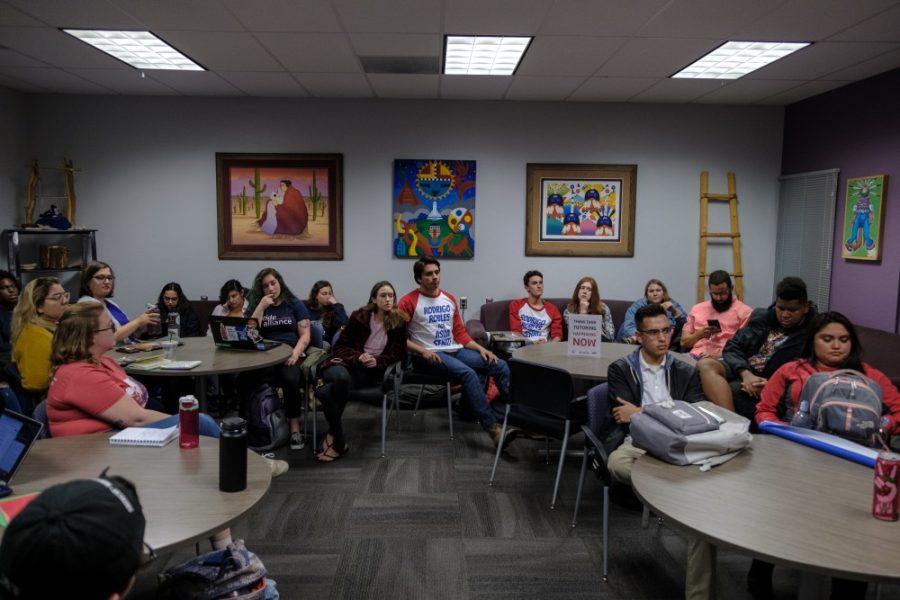If you’re new to campus and looking for a place to voice your opinions or concerns, there is no better place to find involvement than the Associated Students of the University of Arizona.
ASUA is the backbone of the student body on campus that amplifies student voices and provides programs and events for the Wildcat student community.
RELATED: Campus reentry update: Robbins and Carmona share details on new classroom modalities
What is ASUA?
ASUA is the undergraduate student governing body on campus that works closely with students and administration, serving as a liaison between the two parties. It is made up of an executive board which includes a student body president, executive vice president, administrative vice president and 14 senators.
The 14 senators include 11 college-specific senators and three at-large senators, all voted in by the student body. ASUA has many opportunities for involvement, whether it is within ASUA, or with the programs and services it offers for students which includes things like ZonaZoo, Wildcat Events Board or Campus Pantry.
ASUA provides funding for over 600 recognized clubs with thousands of students, according to ASUA’s website. Students searching for involvement on campus don’t have to be involved with ASUA directly to engage and interact with the services and programs it offers, they can find it in any one of these clubs.
What programs does ASUA offer?
ASUA provides everything from club funding to services that aid students like Campus Closet and Campus Pantry. A few big programs that ASUA backs are student and event centric ones like Wildcat Events Board, which puts on Spring Fling, and ZonaZoo, which is the official student section and student ticketing program for UA athletics. Along with these they also started a program called Safe Ride, which is a free, ride sharing service on campus for students.
ASUA also supports many of the advocacy and community groups on campus like the Student Health Advocacy Committee, Pride Alliance, Students for Sustainability and Feminists Organized to Resist, Create, and Empower. These groups help spread the message of what ASUA and UA are while advocating for all students on campus and making them feel included, according to President Tara Singleton. While working with and supporting all of these programs on campus, there is also much work done internally with each senator advocating for their individual colleges and the students in them.
Who are the executives and what are their platforms?
The executive members of the ASUA include the president, executive vice president and administrative vice president. Each of them have different roles within ASUA; the president being the main liaison, the executive vice president overseeing the Senate and clubs along with club funding and the administrative vice president being the main communication with programs and events.
The current executive officers are President Tara Singleton, Executive Vice President Noah Vega and Administrative Vice President Maryan Hassan. All of the current executive officers ran on platforms that agreed on increasing transparency and communication to the university and student populations, according to Singleton, hoping to be able to advocate for their needs on a greater scale.
But with the amount of change that has occurred between elections and the present, Singleton said that the executive officers are shifting their focus for the upcoming 2020-2021 academic year.
“I think all of the initial platforms we ran on are important, things like voter registration and getting people more involved, but with the ever changing global climate we are really starting to focus on diversity and inclusion related issues and social justice, issues that really need to be addressed on our campus,” Singleton said. “So we’ve already started that work, as well as educating ourselves individually, we hope to be a resource for students and hope to push for those issues on campus and advocate for students that are particularly vulnerable right now in this coming year.”
How will ASUA look in the coming year?
ASUA has meetings every week during the academic year, but Singleton says that these meetings, along with programming and events, will most likely begin virtually at the start of the year and adapt to the campus’ environment as the year progresses.
The physical ASUA office space will be aligning with social distancing and mask requirement protocols. Singleton said the biggest concern going forward for ASUA is making sure all students feel safe, comfortable and able to voice their concerns among the COVID-19 pandemic and current issues of social justice.
Graduate Student Professional Council
Along with ASUA, there is also a student government for graduate students: the Graduate and Professional Student Council. Like ASUA, GPSC advocates for students and gives them a place to have their voices heard, establishing better communication in the graduate and professional student Wildcat community.
GPSC advocates for students regarding tuition and fees, research opportunities and funding and benefits. They also provide funding to graduate and professional students for travel grants, research and project grants, achievement awards and professional opportunities development, according to their website.
Follow Maggie Rockwell on Twitter








